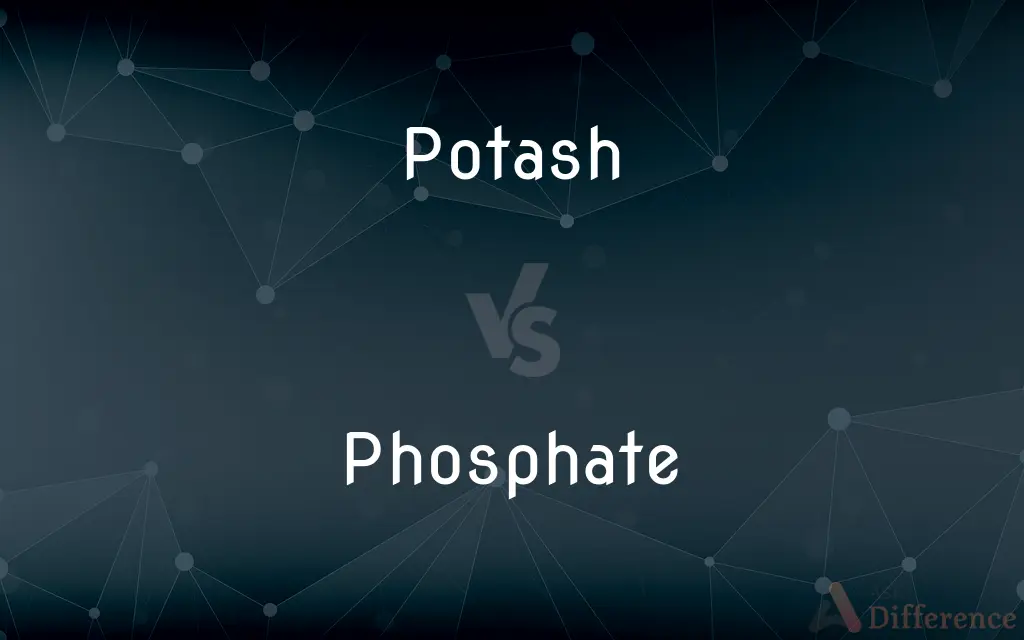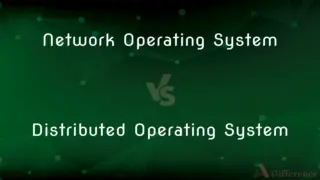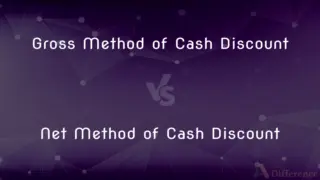Potash vs. Phosphate — What's the Difference?
By Tayyaba Rehman — Published on January 18, 2024
Potash is a potassium-containing compound used in fertilizers, while phosphate refers to phosphorus compounds, also used as nutrients in agriculture.

Difference Between Potash and Phosphate
Table of Contents
ADVERTISEMENT
Key Differences
Potash is a term primarily used to describe various mined and manufactured salts that contain potassium in water-soluble form. Phosphate, on the other hand, refers to rock containing the mineral phosphorite, which is a source of phosphorus used in the production of phosphate fertilizers.
In agriculture, potash is valued for its potassium content, essential for plant growth, water retention, and disease resistance. Phosphate provides phosphorus, necessary for energy transfer, photosynthesis, and nutrient transport within plants.
Potash fertilizers enhance root strength and improve drought resistance in crops, while phosphate fertilizers are crucial for early root formation and speeding up the maturity of plants.
The source of potash is often from ancient salt lakes or mineral deposits, whereas phosphate is mined from phosphate rocks containing various phosphorus compounds.
Potash is chemically known as potassium oxide (K2O) and comes in forms like potassium chloride (KCl) and potassium sulfate (K2SO4). Phosphates, containing the element phosphorus (P), are often used in the form of superphosphate or triple superphosphate.
ADVERTISEMENT
Comparison Chart
Composition
Contains potassium (K).
Contains phosphorus (P).
Agricultural Use
Enhances plant water retention and disease resistance.
Promotes root development and plant maturity.
Sources
Derived from ancient salt lakes and mineral deposits.
Mined from phosphate rocks.
Chemical Forms
Potassium chloride (KCl), potassium sulfate (K2SO4).
Superphosphate, triple superphosphate.
Role in Plant Growth
Essential for overall plant health and growth.
Vital for energy transfer and photosynthesis.
Compare with Definitions
Potash
Potash is a potassium-containing compound used as a fertilizer.
We added potash to our soil to provide potassium for our crops.
Phosphate
Phosphate refers to rock or mineral containing phosphorus, used in fertilizers.
The phosphate rock was processed into fertilizer for our farm.
Potash
It's a source of soluble potassium for plants.
Potash is vital for the potassium nutrition of our fruit trees.
Phosphate
It's essential for plant energy transfer and growth.
Adding phosphate to the soil boosted the energy efficiency of our plants.
Potash
It often comes from ancient dried-up salt lakes.
The potash deposits were mined from an ancient seabed.
Phosphate
Phosphates are mined from phosphorus-rich rocks.
The local mine extracts phosphate for agricultural use.
Potash
Common forms include potassium chloride and sulfate.
We chose sulfate of potash for its sulfur content.
Phosphate
Phosphates help in root development and plant maturity.
Our young plants grew faster after applying phosphate fertilizer.
Potash
Potash improves plant health and resistance to disease.
Using potash has made our plants more resistant to fungal diseases.
Phosphate
Used in agriculture as superphosphate and triple superphosphate.
We used triple superphosphate to ensure high phosphorus content.
Potash
See potassium carbonate.
Phosphate
A salt, ester, or anion of phosphoric acid, derived by removal or replacement of one, two, or especially all three of the hydrogens of phosphoric acid.
Potash
See potassium hydroxide.
Phosphate
A fertilizer containing phosphorus compounds.
Potash
Any of several compounds containing potassium, especially soluble compounds such as potassium oxide, potassium chloride, and various potassium sulfates, used chiefly in fertilizers.
Phosphate
A soda fountain drink made by blending carbonated water with flavored syrup.
Potash
The water-soluble part of the ash formed by burning plant material; used for making soap and glass and as a fertilizer.
Phosphate
(chemistry) Any salt or ester of phosphoric acid.
Potash
(chemistry) An impure form of potassium carbonate (K2CO3) mixed with other potassium salts.
Phosphate
(agriculture) Any fertiliser containing phosphate compounds.
Potash
. Chiefly used in the names of compounds of the form "... of potash".
[[potassium permanganate
Phosphate
Guano (containing high levels of phosphates and harvested for the fertiliser industry).
Potash
A class of potassium minerals, of similar applicability to potassium carbonate, such as being a fertilizer. (ie. potassium chloride, potassium hydroxide)
Phosphate
A carbonated soft drink containing phosphoric acid, often flavored with a fruit-based syrup.
Potash
To treat with potassium.
Phosphate
To treat or coat with a phosphate or with phosphoric acid
Potash
The hydroxide of potassium hydrate, a hard white brittle substance, KOH, having strong caustic and alkaline properties; - hence called also caustic potash.
Phosphate
A salt of phosphoric acid.
Potash
A potassium compound often used in agriculture and industry
Phosphate
A salt of phosphoric acid
Phosphate
Carbonated drink with fruit syrup and a little phosphoric acid
Common Curiosities
Can potash be used in all types of soils?
Potash can be used in most soils but is particularly beneficial in potassium-deficient soils.
What is potash mainly used for?
Potash is mainly used as a potassium-rich fertilizer in agriculture.
Are potash and phosphate naturally occurring?
Yes, both are mined from natural deposits, although they can also be manufactured.
What forms of phosphate are commonly used in fertilizers?
Common forms include single superphosphate and triple superphosphate.
How does phosphate benefit plants?
Phosphate aids in root development, energy transfer, and overall plant growth.
Is potash environmentally friendly?
Potash, when used correctly, is considered environmentally friendly but excessive use can lead to soil and water issues.
How are potash and phosphate applied to crops?
They can be applied directly to the soil or mixed with other fertilizers for application.
Can potash and phosphate be used together?
Yes, they can be used together in balanced fertilization programs.
Can overuse of phosphate harm plants?
Yes, excessive use of phosphate can lead to nutrient imbalances and environmental harm.
How is phosphate mined?
Phosphate is mined from phosphorus-rich rocks through surface mining methods.
How do potash and phosphate affect soil health?
They improve soil health by providing essential nutrients, but balanced application is crucial to avoid negative effects.
How does soil pH affect phosphate availability?
Phosphate availability decreases in both highly acidic and highly alkaline soils.
What crops benefit most from potash?
Potash is particularly beneficial for potassium-demanding crops like potatoes, tomatoes, and corn.
Are there synthetic alternatives to potash and phosphate?
Synthetic fertilizers containing potassium and phosphorus are available but are often derived from natural potash and phosphate sources.
Is there a risk of phosphate runoff?
Yes, phosphate can run off into water bodies, causing environmental issues like eutrophication.
Share Your Discovery

Previous Comparison
Network Operating System vs. Distributed Operating SystemAuthor Spotlight
Written by
Tayyaba RehmanTayyaba Rehman is a distinguished writer, currently serving as a primary contributor to askdifference.com. As a researcher in semantics and etymology, Tayyaba's passion for the complexity of languages and their distinctions has found a perfect home on the platform. Tayyaba delves into the intricacies of language, distinguishing between commonly confused words and phrases, thereby providing clarity for readers worldwide.














































